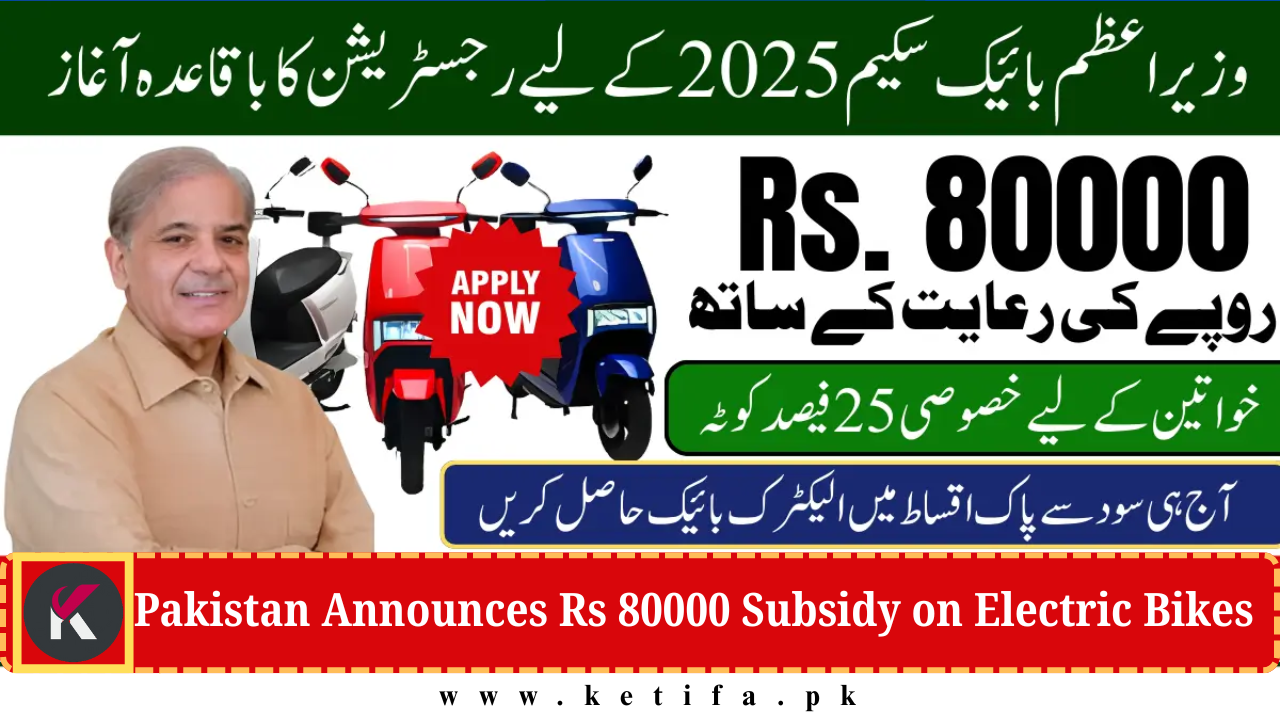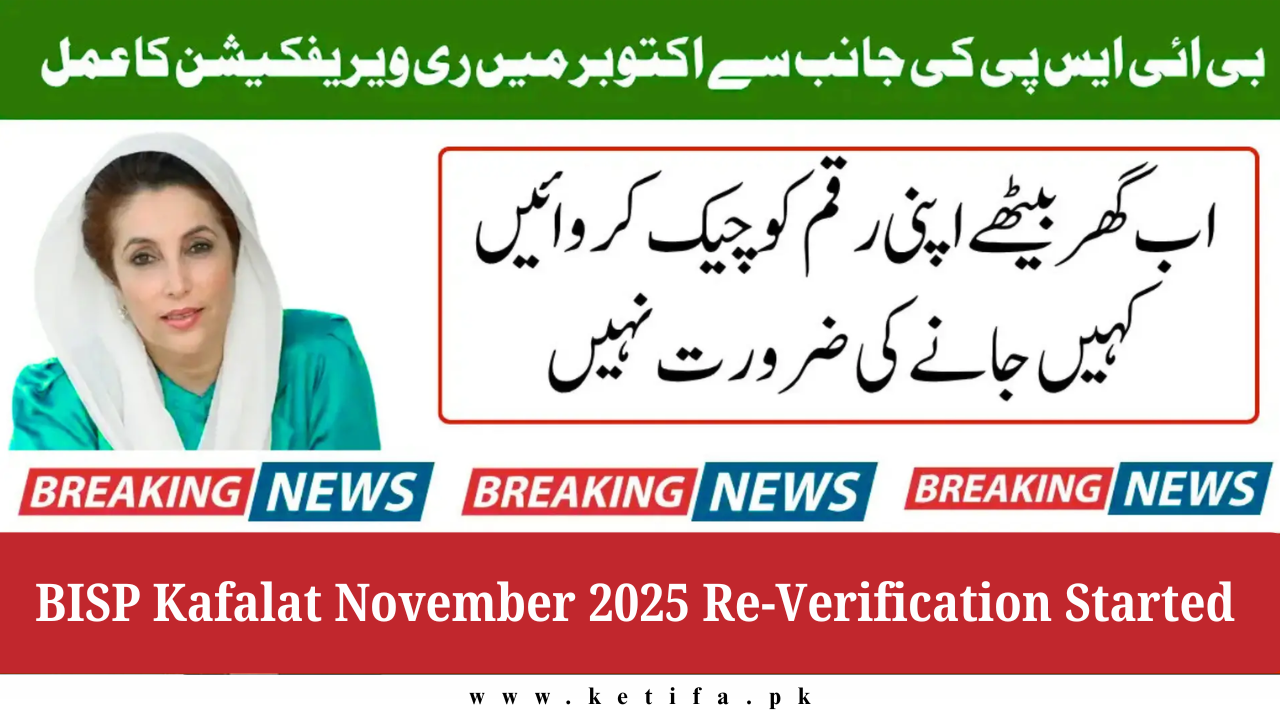In a major move toward promoting clean mobility, the Government of Pakistan has launched a generous Rs 80,000 subsidy on electric bikes (e-bikes) under the National Electric Vehicle (NEV) Policy 2025-30. The initiative aims to make electric transportation affordable, reduce fuel dependency, and create a cleaner, greener Pakistan.
Officials say the new subsidy is part of a broader plan to accelerate the adoption of electric vehicles (EVs) and strengthen local manufacturing of electric components such as batteries, motors, and chargers.
Overview of the Electric Bike Subsidy Scheme
| Category | Details |
|---|---|
| Program Name | Electric Bike Subsidy & EV Policy 2025-30 |
| Launch Year | June 2025 |
| Policy Duration | 2025 – 2030 |
| Subsidy Amount | Up to Rs 80,000 (varying by model) |
| Target Vehicles | Electric bikes and e-rickshaws |
| Application Method | Online registration via federal portal |
Under this scheme, buyers can receive a direct cash subsidy or discount on the purchase of approved e-bikes priced around Rs 250,000, bringing the cost within reach for students, employees, and delivery riders.
Key Features of the NEV Policy 2025-30
The National Electric Vehicle Policy (NEV) 2025-30 lays out a detailed roadmap for Pakistan’s transition to sustainable mobility.
1. Subsidies and Incentives
-
Rs 80,000 subsidy for electric bikes (final amount varies by category).
-
Rs 65,000 for two-wheelers, and up to Rs 400,000 for e-rickshaws.
-
Subsidy for electric cars: up to Rs 15,000 per kWh.
-
Government to support 116,000 e-bikes and 3,000 e-rickshaws in the first phase.
2. Local Manufacturing Goals
The policy emphasizes domestic production of EV components, including batteries, motors, and chargers.
-
Local manufacturing target: within 2–3 years.
-
By 2030, 30% of all new vehicle sales in Pakistan should be electric.
3. Charging Infrastructure
-
Plan to establish 3,000 charging stations nationwide by 2030.
-
40 fast chargers will be installed along major highways and motorways.
-
A reduced electricity tariff of Rs 39.70/kWh has been approved for EV charging.
Why the Government Introduced the Electric Bike Subsidy
Reduce Fuel Imports
Pakistan spends billions annually on oil imports. Switching to EVs could save 2 billion litres of fuel and nearly US$1 billion in foreign exchange each year.
Improve Air Quality
Motorbikes and rickshaws are major contributors to air pollution in urban centres. The e-bike policy will help reduce emissions and improve public health.
Boost Local Industry & Jobs
The shift to EV production will create thousands of new jobs in manufacturing, assembly, and after-sales services. It also aims to attract foreign investment in Pakistan’s growing green tech sector.
How to Apply for the E-Bike Subsidy (Step-by-Step)
Follow these steps to register for the Electric Bike Subsidy Scheme 2025 once the online portal opens:
Step 1: Check Eligibility
-
Must be a Pakistani citizen aged 18 to 65 years.
-
Must select an approved e-bike model listed by the government.
Step 2: Online Registration
-
Visit the official EV subsidy portal (to be announced by the federal government).
-
Fill out the digital application form with your personal, CNIC, and contact details.
Step 3: Verification & Payment
-
Your data will be verified digitally.
-
Pay the remaining balance after subsidy through cash or bank installment plans.
Step 4: Delivery & Registration
-
Once approved, the e-bike will be delivered through an authorized dealer.
-
Registration and warranty will be processed simultaneously.
Benefits for Consumers and Industry
For Consumers
-
Lower cost: Subsidy reduces upfront purchase price.
-
Cheaper running cost: Electricity is far cheaper than petrol.
-
Low maintenance: Electric bikes have fewer mechanical parts.
For Industry
-
Boosts local manufacturing and parts localization.
-
Generates employment in assembly and charging infrastructure sectors.
-
Encourages foreign partnerships in EV technology.
For the Environment
-
Cuts carbon emissions and urban air pollution.
-
Supports Pakistan’s commitment to climate resilience and clean energy.
Challenges Ahead
While the policy marks a major milestone, challenges remain:
-
Infrastructure gaps: Limited number of EV charging stations.
-
Public awareness: Many consumers are still unaware of e-bike benefits.
-
Subsidy ambiguity: Media reports vary between Rs 50,000 and Rs 80,000 subsidies.
-
Supply chain hurdles: Achieving 90% localization by 2030 requires major investment.
Officials assure that monitoring systems and transparent subsidy disbursement will ensure fair implementation.
Future Roadmap for Pakistan’s EV Transition
Looking ahead, the EV Policy 2025-30 envisions:
-
30% of all new vehicles to be electric by 2030.
-
Nationwide network of fast chargers across highways and urban centres.
-
Battery-swapping stations for delivery services and public transport.
-
Integration of EV infrastructure into new building codes and city planning.
If executed effectively, the Electric Bike Subsidy and NEV Policy could redefine urban mobility in Pakistan — making electric vehicles a mainstream, affordable choice for millions.










